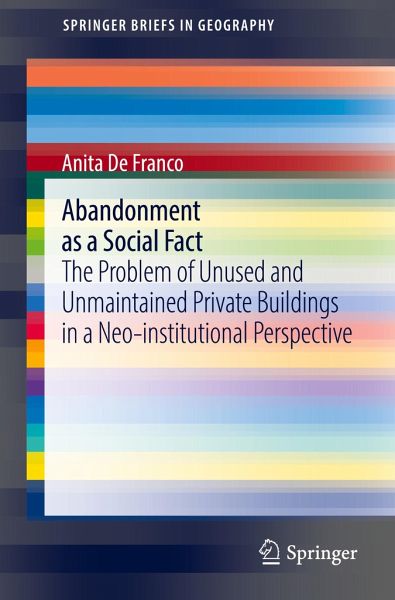
Abandonment as a Social Fact
The Problem of Unused and Unmaintained Private Buildings in a Neo-institutional Perspective

PAYBACK Punkte
23 °P sammeln!
This book provides a multidisciplinary approach for the study of the "abandonment" problem at the inter-section among urban studies, neo-institutionalist perspectives, and social ontology. An analytical framework (based on descriptive and operational issues, factors, reasons, policies) has been built to interpret the phenomenon of abandonment and possible ways of intervening.The work considers the Italian situation in general terms and examines the case study of Milan in depth. This case is interesting because it triggered public discussions on the problem of abandonment in a non-shrinking con...
This book provides a multidisciplinary approach for the study of the "abandonment" problem at the inter-section among urban studies, neo-institutionalist perspectives, and social ontology. An analytical framework (based on descriptive and operational issues, factors, reasons, policies) has been built to interpret the phenomenon of abandonment and possible ways of intervening.
The work considers the Italian situation in general terms and examines the case study of Milan in depth. This case is interesting because it triggered public discussions on the problem of abandonment in a non-shrinking context. Moreover, recently, specific policies to cope with abandonment problem have been introduced.
The purpose of the book is to show that the problem of the "abandonment" of urban buildings should be understood as a social fact and not as a brute fact. Thus, in this work the "abandoned" state of buildings is considered as not directly related to certain physical variables; rather, it entirely depends on human evaluations. Crucial information in this regard is how institutional frameworks (e.g. sets of rules of conduct) influence individual behaviour and actions through time. In this view, we may identify abandonment as a phenomenon intertwined with the actions of both private and public entities. The neo-institutional approach helps to highlight how the problem of abandonment is articulated with respect to property rights, formal constraints, reasons behind policy decisions, intervention strategies and implementations.
The work considers the Italian situation in general terms and examines the case study of Milan in depth. This case is interesting because it triggered public discussions on the problem of abandonment in a non-shrinking context. Moreover, recently, specific policies to cope with abandonment problem have been introduced.
The purpose of the book is to show that the problem of the "abandonment" of urban buildings should be understood as a social fact and not as a brute fact. Thus, in this work the "abandoned" state of buildings is considered as not directly related to certain physical variables; rather, it entirely depends on human evaluations. Crucial information in this regard is how institutional frameworks (e.g. sets of rules of conduct) influence individual behaviour and actions through time. In this view, we may identify abandonment as a phenomenon intertwined with the actions of both private and public entities. The neo-institutional approach helps to highlight how the problem of abandonment is articulated with respect to property rights, formal constraints, reasons behind policy decisions, intervention strategies and implementations.














